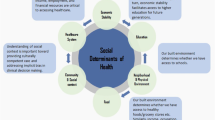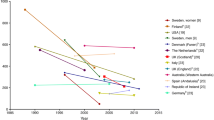Abstract
BACKGROUND
Despite federal guidelines calling for the reduction of obesity and elimination of health disparities, black–white differences in obesity prevalence and in medical expenditures and utilization of health care services persist.
OBJECTIVES
To examine black–white differences in medical expenditures and utilization of health care services (office-based visits, hospital outpatient visits, ER visits, inpatient stays and prescription medication) within body weight categories.
STUDY DESIGN
This study used data from the 2006 Medical Expenditures Panel Survey (MEPS) and included 15,164 non-Hispanic white and non-Hispanic black adults. We used a standard two-part econometric model to examine black–white differences in how expenditures (total annual medical expenditures and expenditures for each type of service) vary within body weight categories.
KEY RESULTS
Blacks in each weight category were less likely to use any medical care than their white counterparts, even after controlling for socio-demographic characteristics, perceived health status, health conditions and health beliefs. Among those who received medical care, there is no significant difference in the total amount spent on care between blacks and whites. Compared to whites, blacks in each body weight category were significantly less likely to use office-based visits, hospital outpatient visits, and medications. Among those who used medications, blacks had significantly lower expenditures than whites. Blacks in obese class II/III were significantly less likely to have any medical expenditures on inpatient care than their white counterparts.
CONCLUSIONS
Black–white racial differences in total medical expenditures were observed in each body weight category and were significantly different in the obese I class, overweight, and healthy weight categories. Obese blacks also spent a smaller amount than obese whites—the insignificance might be due to the smaller sample size. These differences cannot be fully explained by socio-demographics, health conditions, or health beliefs. Black–white differences in medical expenditures may be largely due to relatively inexpensive types of care (office-based visits, outpatient care, medication) rather than more costly ones (inpatient care, ER).

Similar content being viewed by others
References
US Department of Health and Human Services, Healthy People 2020. Available at: http://www.healthypeople.gov/2020/topicsobjectives2020/default.aspx Accessed on December 27, 2011.
Flegal KM, Carroll MD, Ogden CL, Curtin LR. Prevalence and trends in obesity among US adults, 1999-2008. JAMA. 2010;303(3):235–41.
Finkelstein EA, Trogdon JG, Cohen JW, Dietz W. Annual medical spending attributable to obesity: payer- and service-specific estimates. Health Aff (Millwood). 2009;28(5):w822–31.
Bach PB, Cramer LD, Warren JL, Begg CB. Racial differences in the treatment of early-stage lung cancer. N Engl J Med. 1999;341:1198–205.
Trivedi AN, Zaslavsky AM, Schneider EC, Ayanian JZ. Relationship between quality of care and racial disparities in Medicare health plans. JAMA. 2006;296(16):1998–2004.
Schneider EC, Zaslavsky AM, Epstein AM. Racial disparities in the quality of care for enrollees in Medicare managed care. JAMA. 2002;287(10):1288–94.
Canto JG, Allison JJ, Kiefe CI, Fincher C, Farmer R, Sekar P, Person S, Weissman NW. Relation of race and sex to the use of reperfusion therapy in Medicare beneficiaries with acute myocardial infarction. N Engl J Med. 2000;342:1094–100.
Sheifer SE, Escarce JJ, Schulman KA. Race and sex differences in the management of coronary artery disease. Am Heart J. 2000;139:848–57.
Wee CC, Phillips RS, Legedza AT, Davis RB, Soukup JR, Colditz GA, Hamel MB. Health care expendituress associated with overweight and obesity among US adults: importance of age and race. Am J Public Health. 2005;95(1):159–65.
Waidmann T. Estimating the cost of racial and ethnic health disparities. The Urban Institute. 2009.
Andersen RM, McCutcheon A, Aday LA, Chiu GY, Bell R. Exploring dimensions of access to medical care. Health Serv Res. 1983;18(1):49–74.
Andersen RM. Revisiting the behavioral model and access to medical care: does it matter? J Health Soc Behav. 1995;36(1):1–10.
Janz NK, Becker MH. The health belief model: a decade later. Health Educ Q. 1984;11(1):1–47.
Ezzati-Rice TM, Kashihara D, Machlin SR. Health care expenses in the United States. 2000 Rockville (MD): Agency for Healthcare Research and Quality; 2004. MEPS Research Findings No. 21. AHRQ Pub. No. 04-0022.
Executive summary of the clinical guidelines of the identification, evaluation, and treatment of overweight and obesity in adults, Arch Intern Med. 1998; 159:1855–1867.
Singh GK, Kogan MD, van Dyck PC, Siahpush M. Racial/ethnic, socioeconomic, and behavioral determinants of childhood and adolescent obesity in the United States: analyzing independent and joint associations. Ann Epidemiol. 2008;18(9):682–95.
Finkelstein E, Fiebelkorn I, Wang G. National medical spending attributable to overweight and obesity: how much and who’s paying? Health Aff. 2003;W3:219–26.
Cohen SB. Attitudes toward Health Insurance and Their Persistence over Time, Adults 2003–2004. Statistical Brief #161. February 2007. Agency for Healthcare Research and Quality, Rockville, Md. Available at: http://www.meps.ahrq.gov/mepsweb/data_files/publications/st161/stat161.pdf Accessed on December 27, 2011.
Finkelstein E, Trogdon JG, Brown DS, Allaire BT, Dellea PS, Kamal-Bahl SJ. The lifetime medical cost burden of overweight and obesity: implications for obesity prevention. Obesity. 2008;16(8):1843–8.
Fleishman JA, Cohen JW, Manning WG, Kosinski M. Using the SF-12 health status measure to improve predictions of medical expendituress. Med Care. 2006;44(5 Suppl):I54–63.
Dickson M, Plauschinat CA. Racial differences in medication compliance and healthcare utilization among hypertensive Medicaid recipients: fixed-dose vs. free-combination treatment. Ethn Dis. 2008;18(2):204–9.
Institute of Medicine. Unequal treatment: confronting racial and ethnic disparities in health care. Washington: National Academies Press; 2002.
Bleich SN, Pickett-Blakely O, Cooper LA. Physician practice patterns of obesity diagnosis and weight-related counseling. Patient Educ Couns. 2011;82:123–9.
Ezzati M, Martin H, Skjold S, Hoorn SV, Murray CJ. Trends in national and state-level obesity in the USA after correction for self-report bias: analysis of health surveys. J R Soc Med. 2006;99:250–7.
Hausmann LR, Jeong K, Bost JE, Ibrahim SA. Perceived discrimination in health care and health status in a racially diverse sample. Med Care. 2008;46(9):905–14.
Acknowledgements
This research was supported by grant# P60MD000214-01 from the National Center on Minority Health and Health Disparities (NCMHD) of the National Institutes of Health (NIH). The authors greatly appreciate the three anonymous reviewers’ constructive comments and suggestions.
Conflict of Interest
The authors declare that they do not have a conflict of interest.
Author information
Authors and Affiliations
Corresponding author
Rights and permissions
About this article
Cite this article
Ma, S., Frick, K.D., Bleich, S. et al. Racial Disparities in Medical Expenditures within Body Weight Categories. J GEN INTERN MED 27, 780–786 (2012). https://doi.org/10.1007/s11606-011-1983-3
Received:
Revised:
Accepted:
Published:
Issue Date:
DOI: https://doi.org/10.1007/s11606-011-1983-3




